Charles Sturt University: Ethical Theories & Data Harvesting Online
VerifiedAdded on 2023/06/07
|5
|1872
|396
Case Study
AI Summary
This case study critically examines the ethical implications of collecting and utilizing personal data from online surveys, focusing on the practice of "harvesting" personalities. It uses four key ethical theories—Utilitarianism, Deontology, Virtue Theory, and Contract Theory—to evaluate whether such data collection is morally justifiable. The analysis reveals that while Deontology might find the initial data collection permissible if respondents consent, the other theories raise serious concerns about privacy breaches and the potential misuse of personal information for targeted advertising or political messaging. The study concludes that the current practice is largely unethical, advocating for greater transparency and informed consent from survey participants to mitigate these ethical dilemmas. It emphasizes the importance of informing individuals how their data will be used and obtaining their explicit permission to ensure ethical data handling.
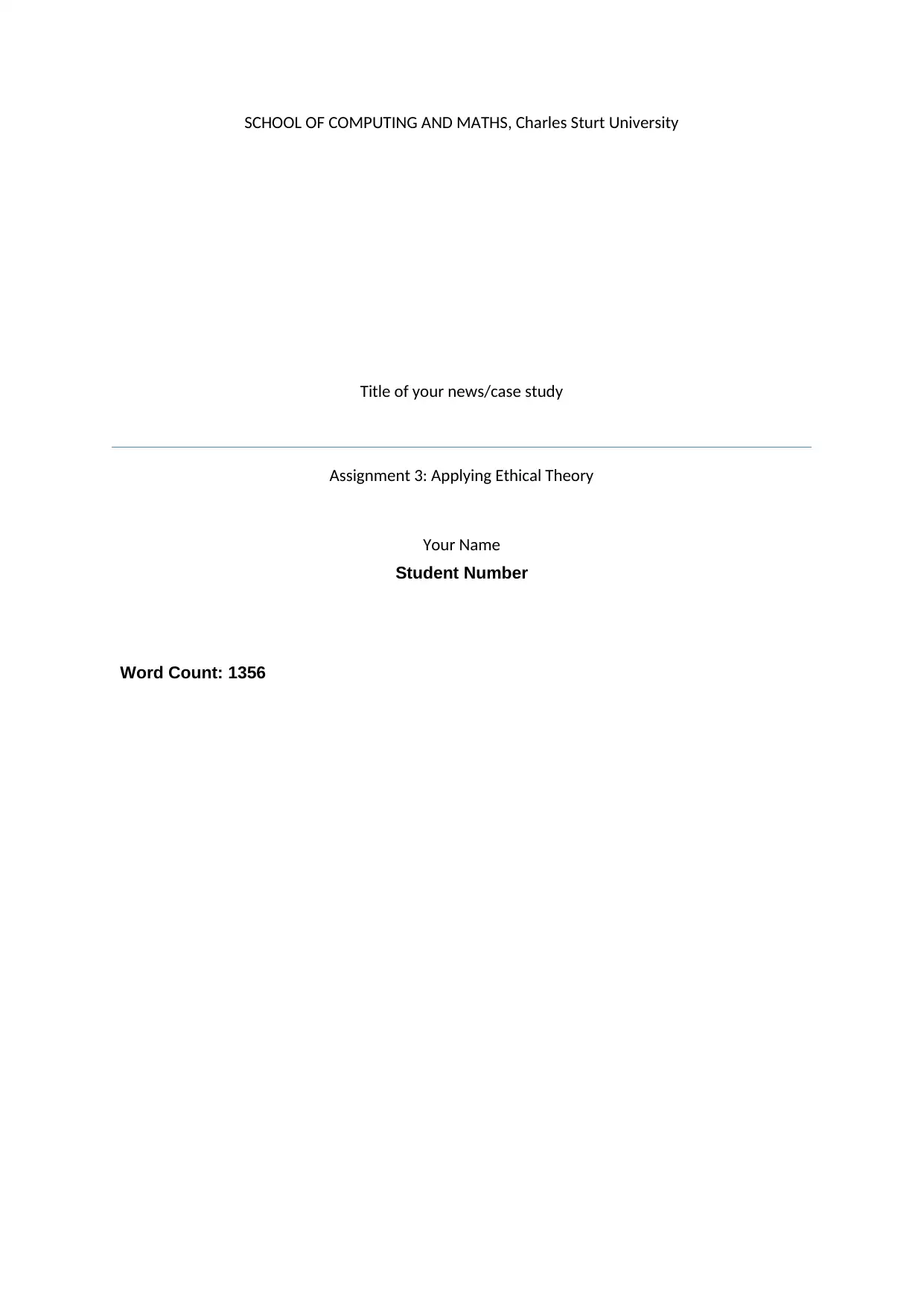
SCHOOL OF COMPUTING AND MATHS, Charles Sturt University
Title of your news/case study
Assignment 3: Applying Ethical Theory
Your Name
Student Number
Word Count: 1356
Title of your news/case study
Assignment 3: Applying Ethical Theory
Your Name
Student Number
Word Count: 1356
Paraphrase This Document
Need a fresh take? Get an instant paraphrase of this document with our AI Paraphraser
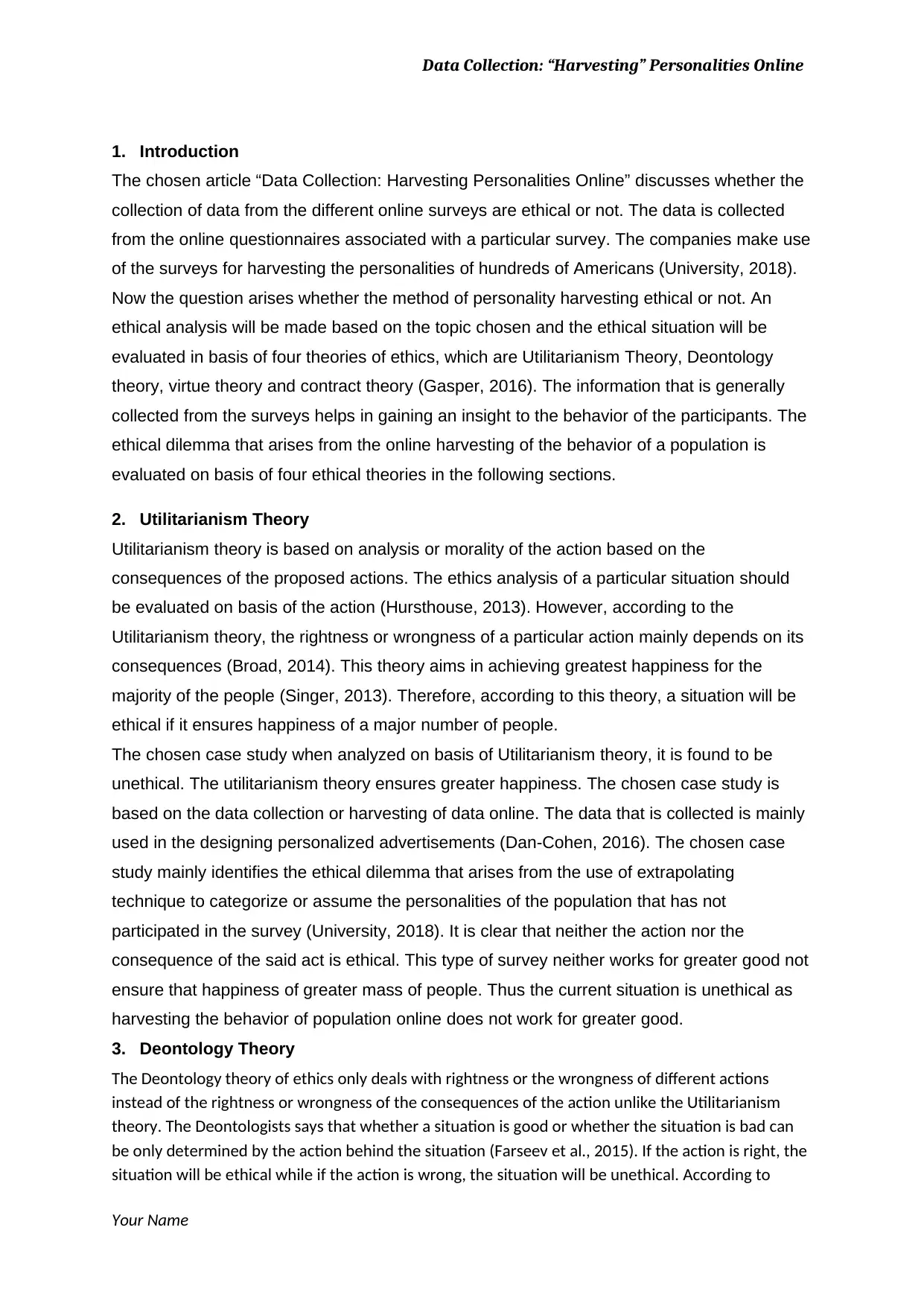
Data Collection: “Harvesting” Personalities Online
1. Introduction
The chosen article “Data Collection: Harvesting Personalities Online” discusses whether the
collection of data from the different online surveys are ethical or not. The data is collected
from the online questionnaires associated with a particular survey. The companies make use
of the surveys for harvesting the personalities of hundreds of Americans (University, 2018).
Now the question arises whether the method of personality harvesting ethical or not. An
ethical analysis will be made based on the topic chosen and the ethical situation will be
evaluated in basis of four theories of ethics, which are Utilitarianism Theory, Deontology
theory, virtue theory and contract theory (Gasper, 2016). The information that is generally
collected from the surveys helps in gaining an insight to the behavior of the participants. The
ethical dilemma that arises from the online harvesting of the behavior of a population is
evaluated on basis of four ethical theories in the following sections.
2. Utilitarianism Theory
Utilitarianism theory is based on analysis or morality of the action based on the
consequences of the proposed actions. The ethics analysis of a particular situation should
be evaluated on basis of the action (Hursthouse, 2013). However, according to the
Utilitarianism theory, the rightness or wrongness of a particular action mainly depends on its
consequences (Broad, 2014). This theory aims in achieving greatest happiness for the
majority of the people (Singer, 2013). Therefore, according to this theory, a situation will be
ethical if it ensures happiness of a major number of people.
The chosen case study when analyzed on basis of Utilitarianism theory, it is found to be
unethical. The utilitarianism theory ensures greater happiness. The chosen case study is
based on the data collection or harvesting of data online. The data that is collected is mainly
used in the designing personalized advertisements (Dan-Cohen, 2016). The chosen case
study mainly identifies the ethical dilemma that arises from the use of extrapolating
technique to categorize or assume the personalities of the population that has not
participated in the survey (University, 2018). It is clear that neither the action nor the
consequence of the said act is ethical. This type of survey neither works for greater good not
ensure that happiness of greater mass of people. Thus the current situation is unethical as
harvesting the behavior of population online does not work for greater good.
3. Deontology Theory
The Deontology theory of ethics only deals with rightness or the wrongness of different actions
instead of the rightness or wrongness of the consequences of the action unlike the Utilitarianism
theory. The Deontologists says that whether a situation is good or whether the situation is bad can
be only determined by the action behind the situation (Farseev et al., 2015). If the action is right, the
situation will be ethical while if the action is wrong, the situation will be unethical. According to
Your Name
1. Introduction
The chosen article “Data Collection: Harvesting Personalities Online” discusses whether the
collection of data from the different online surveys are ethical or not. The data is collected
from the online questionnaires associated with a particular survey. The companies make use
of the surveys for harvesting the personalities of hundreds of Americans (University, 2018).
Now the question arises whether the method of personality harvesting ethical or not. An
ethical analysis will be made based on the topic chosen and the ethical situation will be
evaluated in basis of four theories of ethics, which are Utilitarianism Theory, Deontology
theory, virtue theory and contract theory (Gasper, 2016). The information that is generally
collected from the surveys helps in gaining an insight to the behavior of the participants. The
ethical dilemma that arises from the online harvesting of the behavior of a population is
evaluated on basis of four ethical theories in the following sections.
2. Utilitarianism Theory
Utilitarianism theory is based on analysis or morality of the action based on the
consequences of the proposed actions. The ethics analysis of a particular situation should
be evaluated on basis of the action (Hursthouse, 2013). However, according to the
Utilitarianism theory, the rightness or wrongness of a particular action mainly depends on its
consequences (Broad, 2014). This theory aims in achieving greatest happiness for the
majority of the people (Singer, 2013). Therefore, according to this theory, a situation will be
ethical if it ensures happiness of a major number of people.
The chosen case study when analyzed on basis of Utilitarianism theory, it is found to be
unethical. The utilitarianism theory ensures greater happiness. The chosen case study is
based on the data collection or harvesting of data online. The data that is collected is mainly
used in the designing personalized advertisements (Dan-Cohen, 2016). The chosen case
study mainly identifies the ethical dilemma that arises from the use of extrapolating
technique to categorize or assume the personalities of the population that has not
participated in the survey (University, 2018). It is clear that neither the action nor the
consequence of the said act is ethical. This type of survey neither works for greater good not
ensure that happiness of greater mass of people. Thus the current situation is unethical as
harvesting the behavior of population online does not work for greater good.
3. Deontology Theory
The Deontology theory of ethics only deals with rightness or the wrongness of different actions
instead of the rightness or wrongness of the consequences of the action unlike the Utilitarianism
theory. The Deontologists says that whether a situation is good or whether the situation is bad can
be only determined by the action behind the situation (Farseev et al., 2015). If the action is right, the
situation will be ethical while if the action is wrong, the situation will be unethical. According to
Your Name
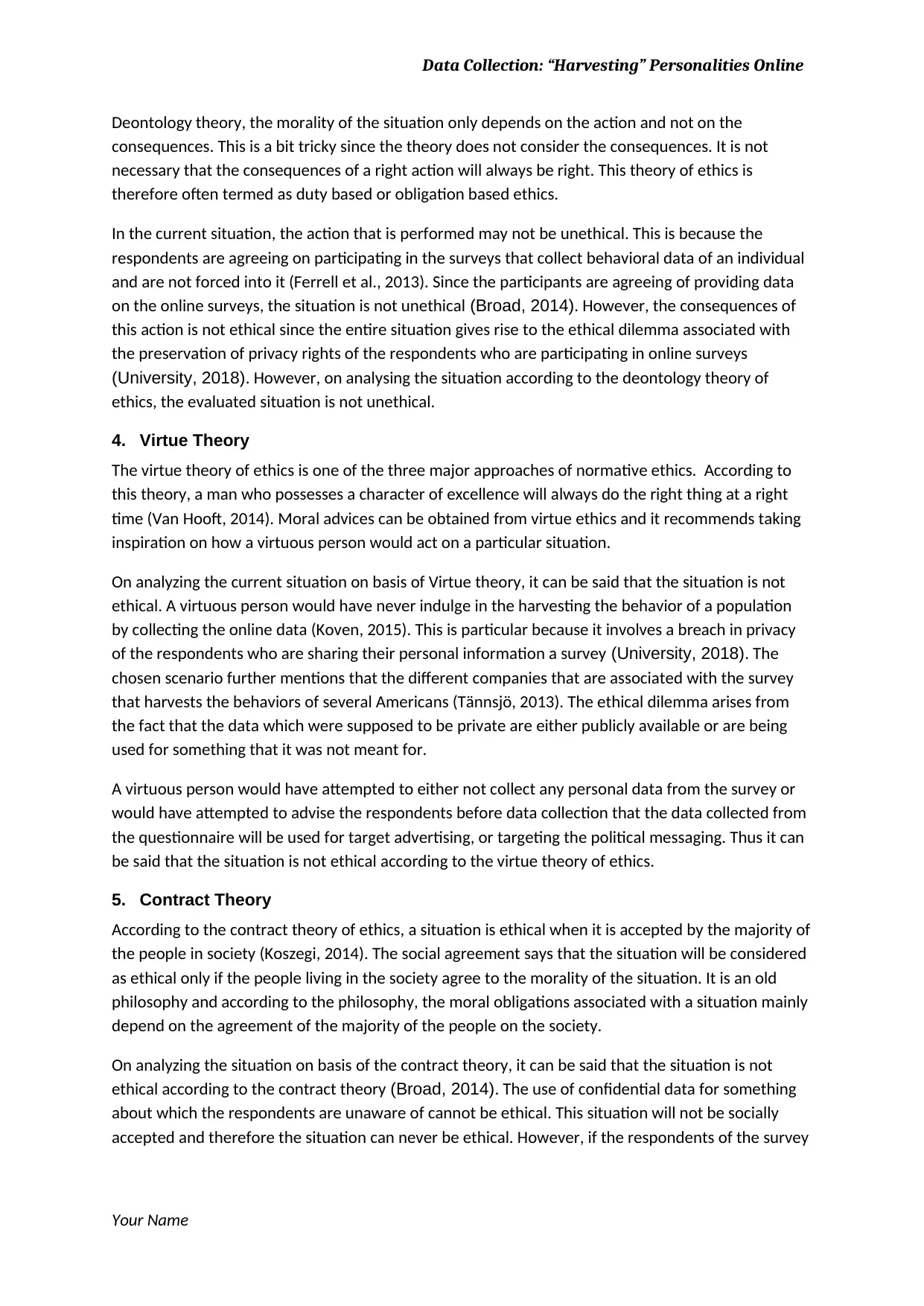
Data Collection: “Harvesting” Personalities Online
Deontology theory, the morality of the situation only depends on the action and not on the
consequences. This is a bit tricky since the theory does not consider the consequences. It is not
necessary that the consequences of a right action will always be right. This theory of ethics is
therefore often termed as duty based or obligation based ethics.
In the current situation, the action that is performed may not be unethical. This is because the
respondents are agreeing on participating in the surveys that collect behavioral data of an individual
and are not forced into it (Ferrell et al., 2013). Since the participants are agreeing of providing data
on the online surveys, the situation is not unethical (Broad, 2014). However, the consequences of
this action is not ethical since the entire situation gives rise to the ethical dilemma associated with
the preservation of privacy rights of the respondents who are participating in online surveys
(University, 2018). However, on analysing the situation according to the deontology theory of
ethics, the evaluated situation is not unethical.
4. Virtue Theory
The virtue theory of ethics is one of the three major approaches of normative ethics. According to
this theory, a man who possesses a character of excellence will always do the right thing at a right
time (Van Hooft, 2014). Moral advices can be obtained from virtue ethics and it recommends taking
inspiration on how a virtuous person would act on a particular situation.
On analyzing the current situation on basis of Virtue theory, it can be said that the situation is not
ethical. A virtuous person would have never indulge in the harvesting the behavior of a population
by collecting the online data (Koven, 2015). This is particular because it involves a breach in privacy
of the respondents who are sharing their personal information a survey (University, 2018). The
chosen scenario further mentions that the different companies that are associated with the survey
that harvests the behaviors of several Americans (Tännsjö, 2013). The ethical dilemma arises from
the fact that the data which were supposed to be private are either publicly available or are being
used for something that it was not meant for.
A virtuous person would have attempted to either not collect any personal data from the survey or
would have attempted to advise the respondents before data collection that the data collected from
the questionnaire will be used for target advertising, or targeting the political messaging. Thus it can
be said that the situation is not ethical according to the virtue theory of ethics.
5. Contract Theory
According to the contract theory of ethics, a situation is ethical when it is accepted by the majority of
the people in society (Koszegi, 2014). The social agreement says that the situation will be considered
as ethical only if the people living in the society agree to the morality of the situation. It is an old
philosophy and according to the philosophy, the moral obligations associated with a situation mainly
depend on the agreement of the majority of the people on the society.
On analyzing the situation on basis of the contract theory, it can be said that the situation is not
ethical according to the contract theory (Broad, 2014). The use of confidential data for something
about which the respondents are unaware of cannot be ethical. This situation will not be socially
accepted and therefore the situation can never be ethical. However, if the respondents of the survey
Your Name
Deontology theory, the morality of the situation only depends on the action and not on the
consequences. This is a bit tricky since the theory does not consider the consequences. It is not
necessary that the consequences of a right action will always be right. This theory of ethics is
therefore often termed as duty based or obligation based ethics.
In the current situation, the action that is performed may not be unethical. This is because the
respondents are agreeing on participating in the surveys that collect behavioral data of an individual
and are not forced into it (Ferrell et al., 2013). Since the participants are agreeing of providing data
on the online surveys, the situation is not unethical (Broad, 2014). However, the consequences of
this action is not ethical since the entire situation gives rise to the ethical dilemma associated with
the preservation of privacy rights of the respondents who are participating in online surveys
(University, 2018). However, on analysing the situation according to the deontology theory of
ethics, the evaluated situation is not unethical.
4. Virtue Theory
The virtue theory of ethics is one of the three major approaches of normative ethics. According to
this theory, a man who possesses a character of excellence will always do the right thing at a right
time (Van Hooft, 2014). Moral advices can be obtained from virtue ethics and it recommends taking
inspiration on how a virtuous person would act on a particular situation.
On analyzing the current situation on basis of Virtue theory, it can be said that the situation is not
ethical. A virtuous person would have never indulge in the harvesting the behavior of a population
by collecting the online data (Koven, 2015). This is particular because it involves a breach in privacy
of the respondents who are sharing their personal information a survey (University, 2018). The
chosen scenario further mentions that the different companies that are associated with the survey
that harvests the behaviors of several Americans (Tännsjö, 2013). The ethical dilemma arises from
the fact that the data which were supposed to be private are either publicly available or are being
used for something that it was not meant for.
A virtuous person would have attempted to either not collect any personal data from the survey or
would have attempted to advise the respondents before data collection that the data collected from
the questionnaire will be used for target advertising, or targeting the political messaging. Thus it can
be said that the situation is not ethical according to the virtue theory of ethics.
5. Contract Theory
According to the contract theory of ethics, a situation is ethical when it is accepted by the majority of
the people in society (Koszegi, 2014). The social agreement says that the situation will be considered
as ethical only if the people living in the society agree to the morality of the situation. It is an old
philosophy and according to the philosophy, the moral obligations associated with a situation mainly
depend on the agreement of the majority of the people on the society.
On analyzing the situation on basis of the contract theory, it can be said that the situation is not
ethical according to the contract theory (Broad, 2014). The use of confidential data for something
about which the respondents are unaware of cannot be ethical. This situation will not be socially
accepted and therefore the situation can never be ethical. However, if the respondents of the survey
Your Name
⊘ This is a preview!⊘
Do you want full access?
Subscribe today to unlock all pages.

Trusted by 1+ million students worldwide
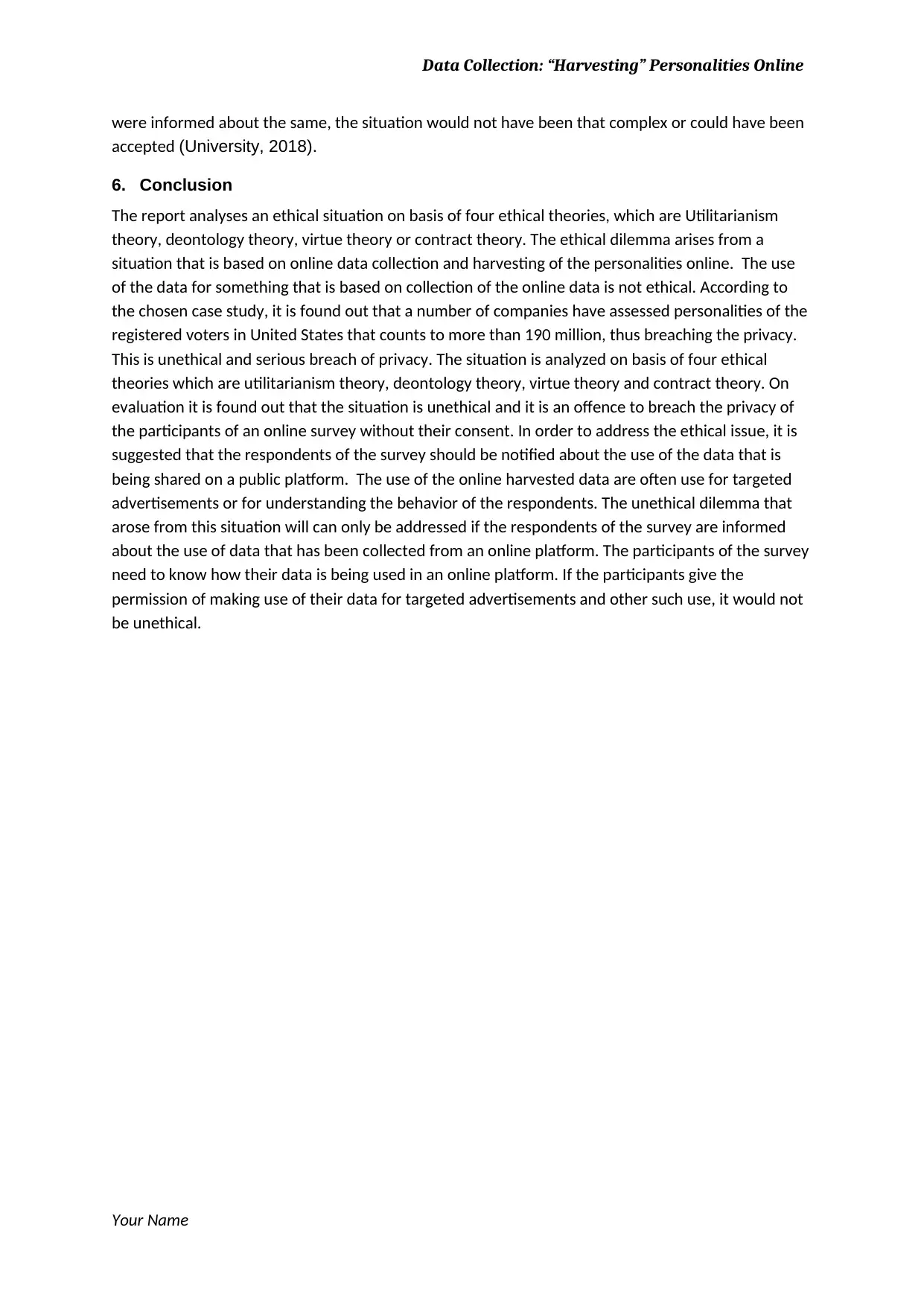
Data Collection: “Harvesting” Personalities Online
were informed about the same, the situation would not have been that complex or could have been
accepted (University, 2018).
6. Conclusion
The report analyses an ethical situation on basis of four ethical theories, which are Utilitarianism
theory, deontology theory, virtue theory or contract theory. The ethical dilemma arises from a
situation that is based on online data collection and harvesting of the personalities online. The use
of the data for something that is based on collection of the online data is not ethical. According to
the chosen case study, it is found out that a number of companies have assessed personalities of the
registered voters in United States that counts to more than 190 million, thus breaching the privacy.
This is unethical and serious breach of privacy. The situation is analyzed on basis of four ethical
theories which are utilitarianism theory, deontology theory, virtue theory and contract theory. On
evaluation it is found out that the situation is unethical and it is an offence to breach the privacy of
the participants of an online survey without their consent. In order to address the ethical issue, it is
suggested that the respondents of the survey should be notified about the use of the data that is
being shared on a public platform. The use of the online harvested data are often use for targeted
advertisements or for understanding the behavior of the respondents. The unethical dilemma that
arose from this situation will can only be addressed if the respondents of the survey are informed
about the use of data that has been collected from an online platform. The participants of the survey
need to know how their data is being used in an online platform. If the participants give the
permission of making use of their data for targeted advertisements and other such use, it would not
be unethical.
Your Name
were informed about the same, the situation would not have been that complex or could have been
accepted (University, 2018).
6. Conclusion
The report analyses an ethical situation on basis of four ethical theories, which are Utilitarianism
theory, deontology theory, virtue theory or contract theory. The ethical dilemma arises from a
situation that is based on online data collection and harvesting of the personalities online. The use
of the data for something that is based on collection of the online data is not ethical. According to
the chosen case study, it is found out that a number of companies have assessed personalities of the
registered voters in United States that counts to more than 190 million, thus breaching the privacy.
This is unethical and serious breach of privacy. The situation is analyzed on basis of four ethical
theories which are utilitarianism theory, deontology theory, virtue theory and contract theory. On
evaluation it is found out that the situation is unethical and it is an offence to breach the privacy of
the participants of an online survey without their consent. In order to address the ethical issue, it is
suggested that the respondents of the survey should be notified about the use of the data that is
being shared on a public platform. The use of the online harvested data are often use for targeted
advertisements or for understanding the behavior of the respondents. The unethical dilemma that
arose from this situation will can only be addressed if the respondents of the survey are informed
about the use of data that has been collected from an online platform. The participants of the survey
need to know how their data is being used in an online platform. If the participants give the
permission of making use of their data for targeted advertisements and other such use, it would not
be unethical.
Your Name
Paraphrase This Document
Need a fresh take? Get an instant paraphrase of this document with our AI Paraphraser
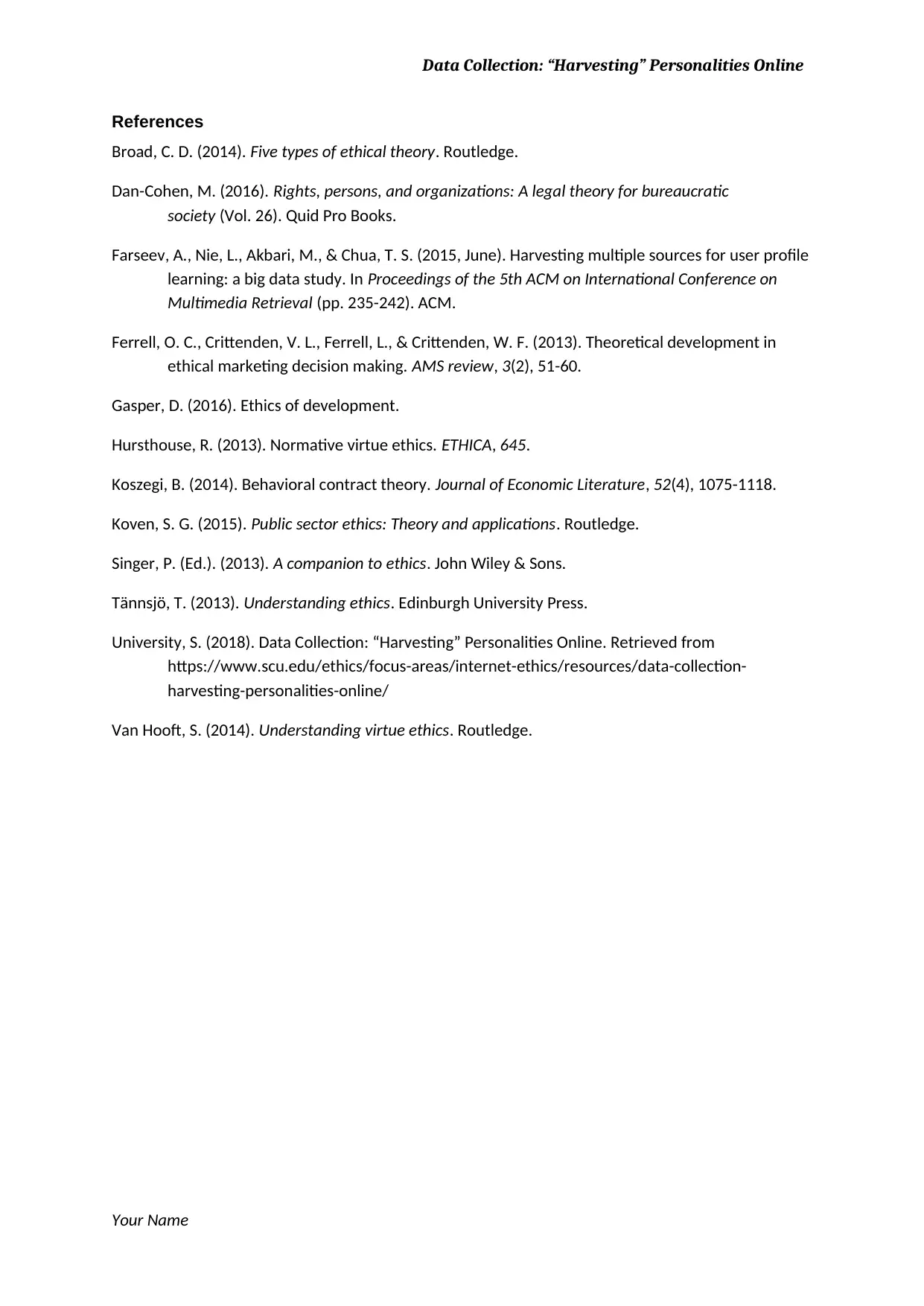
Data Collection: “Harvesting” Personalities Online
References
Broad, C. D. (2014). Five types of ethical theory. Routledge.
Dan-Cohen, M. (2016). Rights, persons, and organizations: A legal theory for bureaucratic
society (Vol. 26). Quid Pro Books.
Farseev, A., Nie, L., Akbari, M., & Chua, T. S. (2015, June). Harvesting multiple sources for user profile
learning: a big data study. In Proceedings of the 5th ACM on International Conference on
Multimedia Retrieval (pp. 235-242). ACM.
Ferrell, O. C., Crittenden, V. L., Ferrell, L., & Crittenden, W. F. (2013). Theoretical development in
ethical marketing decision making. AMS review, 3(2), 51-60.
Gasper, D. (2016). Ethics of development.
Hursthouse, R. (2013). Normative virtue ethics. ETHICA, 645.
Koszegi, B. (2014). Behavioral contract theory. Journal of Economic Literature, 52(4), 1075-1118.
Koven, S. G. (2015). Public sector ethics: Theory and applications. Routledge.
Singer, P. (Ed.). (2013). A companion to ethics. John Wiley & Sons.
Tännsjö, T. (2013). Understanding ethics. Edinburgh University Press.
University, S. (2018). Data Collection: “Harvesting” Personalities Online. Retrieved from
https://www.scu.edu/ethics/focus-areas/internet-ethics/resources/data-collection-
harvesting-personalities-online/
Van Hooft, S. (2014). Understanding virtue ethics. Routledge.
Your Name
References
Broad, C. D. (2014). Five types of ethical theory. Routledge.
Dan-Cohen, M. (2016). Rights, persons, and organizations: A legal theory for bureaucratic
society (Vol. 26). Quid Pro Books.
Farseev, A., Nie, L., Akbari, M., & Chua, T. S. (2015, June). Harvesting multiple sources for user profile
learning: a big data study. In Proceedings of the 5th ACM on International Conference on
Multimedia Retrieval (pp. 235-242). ACM.
Ferrell, O. C., Crittenden, V. L., Ferrell, L., & Crittenden, W. F. (2013). Theoretical development in
ethical marketing decision making. AMS review, 3(2), 51-60.
Gasper, D. (2016). Ethics of development.
Hursthouse, R. (2013). Normative virtue ethics. ETHICA, 645.
Koszegi, B. (2014). Behavioral contract theory. Journal of Economic Literature, 52(4), 1075-1118.
Koven, S. G. (2015). Public sector ethics: Theory and applications. Routledge.
Singer, P. (Ed.). (2013). A companion to ethics. John Wiley & Sons.
Tännsjö, T. (2013). Understanding ethics. Edinburgh University Press.
University, S. (2018). Data Collection: “Harvesting” Personalities Online. Retrieved from
https://www.scu.edu/ethics/focus-areas/internet-ethics/resources/data-collection-
harvesting-personalities-online/
Van Hooft, S. (2014). Understanding virtue ethics. Routledge.
Your Name
1 out of 5
Related Documents
Your All-in-One AI-Powered Toolkit for Academic Success.
+13062052269
info@desklib.com
Available 24*7 on WhatsApp / Email
![[object Object]](/_next/static/media/star-bottom.7253800d.svg)
Unlock your academic potential
Copyright © 2020–2026 A2Z Services. All Rights Reserved. Developed and managed by ZUCOL.




